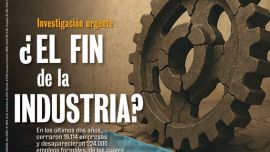Argentina’s Javier Milei has spent his presidency cozying up to Donald Trump. So far, it hasn’t kept his nation off the front lines of the US leader’s global trade war.
Trump this week ordered 25 percent tariffs on steel and aluminum that could hammer the nation that ranked as the seventh-largest supplier of the latter metal to the United States last year, according to the Census Bureau. On Thursday, he told his government to propose reciprocal levies on countries that charge steep tariffs on US goods — a direct threat to highly-protectionist Argentina and its nearly US$30 billion in annual trade with the US.
While too early to estimate the impact the tariffs would have on Argentina, they are set to test a pillar of Milei’s political strategy: the libertarian president has enthusiastically embraced Trump, made pilgrimages to US conservative events and even pitched the idea of a free trade agreement with the United Sttes — all part of a push to bolster his clout abroad while rebuilding a beleaguered economy at home.
But Argentina’s suddenly vulnerable position demonstrates that not even friends are clear of Trump’s trade ire, a challenge for any leader like Milei who may see personal affinity as their path out of his glare.
“Milei has a privileged relationship with Trump, but he needs to build the diplomatic scaffolding to get concrete results,” said Juan Cruz Díaz, a political analyst in Buenos Aires. “The next few weeks will be key to trying to reduce the hit on Argentina of a global policy.”
He’ll get his first crack next week: Milei is planning to attend the Trump-friendly Conservative Political Action Conference in the United States, where he is seeking a meeting with his counterpart, Infobae reported.
The new metals tariffs aren’t set to start until March 12, while the US will conduct studies on country-specific reciprocal levies that should take until April to complete, according to its own estimates. That gives Milei some time to swing a deal — and recent history suggests it’s possible.
During his first term, Trump agreed to exempt Argentina from higher steel and aluminum tariffs after reaching a quota agreement with former president Mauricio Macri. Erstwhile Brazil leader Jair Bolsonaro, who like Milei built close bonds with his fellow right-wing populist, later succeeded in saving a similar agreement after Trump threatened to end it.
Canada and Mexico also just won postponements on levies Trump had pledged to impose, even though their leaders are ideological opposites of the US president.
But reaching a deal may not be easy. Trump insisted this week that the metals tariffs would be implemented “without exceptions or exemptions” this time around, and in his proclamation accused Argentina of continuing to export steel to the United States at “unsustainable quantities.” The document also dinged Argentina’s official trade statistics for making it “difficult to assess the levels of steel being imported from places like China and Russia, and other potential sources of excess capacity.”
Avoiding reciprocal tariffs could prove even more difficult after Trump said Thursday that he had decided to match “whatever countries charge the United States of America.”
Outside of Venezuela, Argentina applies the highest average tariff of any country in Latin America, according to United Nations data. The average US levy on imports is about 3.5 percent, while Argentina’s average import tax on foreign goods is 13.5 percent.
“Trump is doing something different this time around, which is these reciprocal tariffs. And that’s where Argentina has a problem,” said Marcelo Elizondo, an Argentine consultant who specialises in trade. “Argentina is a very closed-off economy with very high tariffs. We have much higher tariffs on American products than they have on our products.”
The stakes are high for Milei, who has rested his presidency on his ability to rebuild Argentina’s crisis-prone economy — and his argument that short-term pain caused by a “shock therapy” approach would lead to future prosperity. That vision has so far wooed global investors, who have bought up sovereign bonds and moved to spend big on energy and mining. And inflation, which was near 200 percent on an annual basis when he took office, slowed to 84.5 percent in January.
But the tariff threats have generated deep concerns among companies with Argentine operations like Aluar, an aluminum producer that exports most of its product to North America, and steel pipe manufacturer Tenaris SA, part of billionaire Paolo Rocca’s Techint Group empire.
Argentines, meanwhile, are pessimistic about Trump’s return no matter Milei’s efforts to paint himself as one of the new president’s closest friends. Nearly half expect Trump to have a negative impact on Argentina, compared to 37 percent who think he will help, according to LatAm Pulse, a survey conducted by AtlasIntel for Bloomberg News in late January and released this week.
About 60 percent said they are fearful of tariffs, and unlike their neighbours in Brazil, Chile and Colombia, Argentines aren’t yet convinced that their government should forge closer ties to the United States: While clear majorities in those three nations backed the idea, Argentines were evenly split.
by Jonathan Gilbert, Bloomberg






















Comments